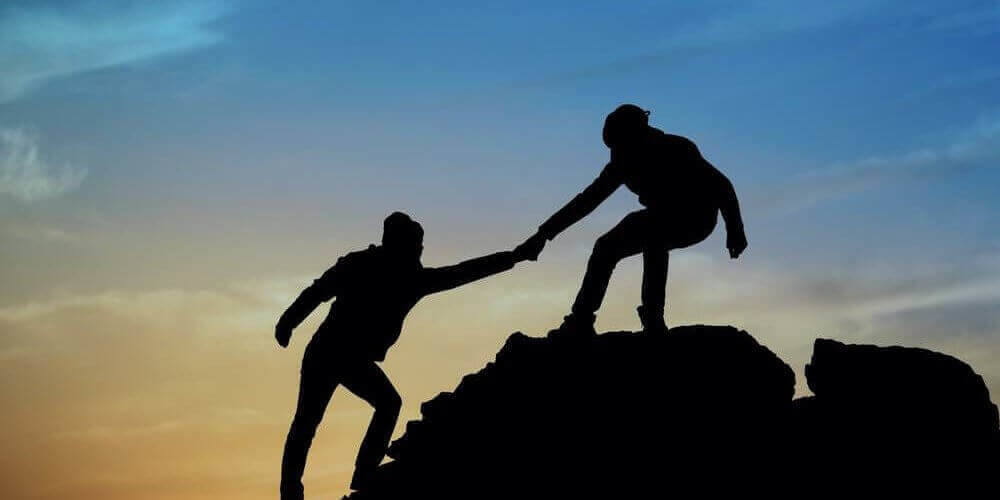The main criteria for choosing a sponsor is to find someone who has what we want, and then to do what they did. Nobody can know what you have if you get to the meetings late, say nothing through all of the sharing and then sneak out after the meeting is over. Virtually all of my sponsees came up to me after I shared something in a meeting that struck them. Err on the side of saying something in your meetings. Share with a commitment to the 5th Tradition: its primary purpose should be to carry the message to the alcoholic who is still suffering. If you consistently share from this place, sooner or later some suffering alcoholics will want to hear more from you. This is where sponsees come from.
3. Get newcomer phone numbers
Sponsorship should be rooted in the 11th Tradition: attraction, not promotion. Still, sometimes newcomers, or those struggling to get into the program, can use a little nudge. One way to do this is to note folks who identify themselves as being in early sobriety, who share about their struggles, or who look unsteady or new as they try to hide in the back rows and corners. After the meeting, ask them how they are doing, share your experience, and ask for their phone number. We all know about asking for older members’ numbers when we are new, and we frequently trade numbers with our peers. But reaching out to those newer than you can not only encourage some of them to work with you as a sponsor, it can help them get in the habit of reaching out more generally.
One tip: make sure to call or text them the very next day. In my experience, if I wait more than a day, I will keep putting off calling and I’ll end up never reaching out. Most of the time, they don’t end up working with me, but for a week or two, we’ll talk regularly, helping them get over the hump of early sobriety. When my program is lagging, this sort of reaching out is a guaranteed way of bringing back the spark of early sobriety.
4. Volunteer at hospitals and institutions
Hospitals, treatment centers, jails, outpatient clinics, and other institutions can be important places to find sponsees. If you went to treatment, chances are your treatment center would love to have you back as a speaker. Say yes to them. If your home group does hospital and institution (H&I) service, join them on a trip. If your home group doesn’t do this, you can help them get it started—call your local intergroup, check with other meetings in your area, or even call the AA General Service Office. Such leadership can bring sponsees out of the woodwork, but even if it doesn’t, this service accomplishes the basic goal at hand: the need to pass the message on to other alcoholics and addicts. It will help you stay sober.
5. Ask your sponsor
Finally, remember that you cannot successfully sponsor others unless you yourself have a sponsor. Every question or concern your sponsees will bring to you has three possible answers: your experience, what the literature says, and “I’ll ask my sponsor.” If you don’t have someone to go to, you are not only undermining your own recovery, you are shortchanging your sponsees.
Even before that, however, your sponsor obviously knows something about attracting people who want to work with him or her. Ask them what they did, and how they have come to be a sponsor. They might say some of the things we said here—they probably pray for sponsees, you’ve heard them share at meetings, they take an active interest in newcomers and those struggling to stay sober, they are likely involved in service work and they have a sponsor of their own that has helped them find a path through this fellowship. They may have other insights as well, so be sure to ask.
That is one of the real miracles of this program: not only seeing your own sponsees grow and get better, but to then see them pass the message on to someone else, to have them calling you about how to sponsor others. We enter into a chain of service, recovery and unity that stretches from Bill and Dr. Bob and carries this message to the next generation of drunks and addicts who will need it. By turning to your Higher Power, your own sponsor, your fellowship and the newcomers in your midst, you can find people to work with so that you can make the most of this “possible means of recovery” that has worked for so many others over the years.
Original Article from TheFix.com
Red Rock Recovery Center is a Colorado state licensed substance abuse extended care treatment program designed to help you or your loved one recover from the struggles associated with alcoholism and drug addiction. Located in Denver, Colorado we offer a safe haven for those afflicted by the ravages of untreated addiction. Our program is based on a compassionate 12-step model that applies behavioral as well as life skill therapies, which will enable our clients to heal and recover.
#recovery #drugrehab #redrockrecovery




